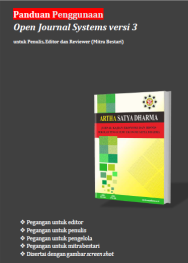PERAN TQM DAN BUDAYA ORGANISASI DALAM MENINGKATKAN KINERJA PDAM KABUPATEN BULELENG
Abstract
Penurunan kinerja PDAM Kabupaten Buleleng tentunya berakibat pada penurunan kinerja organisasi. Manajemen mutu terpadu (TQM) dibutuhkan untuk perbaikan proses dan kegiatan operasi yang efektif secara terus menerus. Penelitian ini bertujuan mengkaji hubungan budaya organisasi, manajemen mutu terpadu dan kinerja operasi dalam perannya meningkatkan kinerja organisasi PDAM Kabupaten Buleleng. Teknik analisis yang digunakan dalam penelitian ini adalah model persamaan struktural (Structural Equation Modeling-SEM) Partial Least Square (PLS), yaitu berbasis variance atau Component based SEM. Hasil penelitian menunjukan budaya organisasi tidak berpengaruh terhadap manajemen mutu terpadu. Budaya organisasi berpengaruh terhadap kinerja operasi, tetapi tidak berpengaruh terhadap kinerja organisasi. Manajemen mutu terpadu tidak berpengaruh terhadap kinerja operasi, tetapi berpengaruh terhadap kinerja organisasi. Manajemen mutu terpadu berperan secara strategis dalam pencapaian tujuan PDAM Kabupaten Buleleng, tetapi belum diterapkan secara menyeluruh pada tingkatan operasional.
Downloads
References
Akhtar, S. (2010). The effect of
soft factors and quality
improvement on performance of
Malaysia’s electrical and
electronics industry’.
International Journal of
Management Science and
Engineering Management, 5(1),
39-43.
Almansour, Y. M. 2012) “The impact
of total quality management
components on small and
medium enterprises’financial
performance in Jordan”. Journal
of Arts, Science & Commerce
3(1), 5: 87-91.
Arumugam, V., K. B. Ooi, K.B. and
Fong T.C. (2008). "TQM
practices and quality management
performance: An investigation of
their relationship using data from
ISO 9001: 2000 firms in
Malaysia." The TQM Journal
20(6): 636-650.
Asikhia, O. (2010). "Customer
Orientation and Firm
Performance among Nigerian
Small and Medium Scale
Businesses." International Journal
of Marketing Studies, 2(1): 197-
205.
Bahri, Syamsul, Djabir Hamzah, and
Ria Mardiana Yusuf. 2012.
“Implementation of Total Quality
Management and Its Effect on
Organizational Performance of
Manufacturing Industries
Through Organizational Culture
in South Sulawesi, Indonesia.”
Journal of Business and
Management 5(1):10–24.
Retrieved
(http://iosrjournals.org/iosrjbm/
papers/Vol5-
issue1/C0511024.pdf).
Baird, Kevin, Kristal Jia Hu, and
Robert Reeve. 2011. “The
Relationships between
Organizational Culture, Total
Quality Management Practices
and Operational Performance.”
International Journal of
Operations & Production
Management 31(7):789–814.
Retrieved (http://www.emeraldinsight.com/
doi/10.1108/0144357111114485).
Fotopoulos, C. V., and Psomas, E. L.
(2010). The structural
relationships between TQM
factors and organizational
performance. The TQM Journal,
22(5), 539-552.
Gambi, Lillian Do Nascimento, Harry
Boer, Mateus Cecilio Gerolamo,
Frances Jørgensen, and Luiz
Cesar Ribeiro Carpinetti. 2015.
“The Relationship between
Organizational Culture and
Quality Techniques, and Its
Impact on Operational
Performance.” International
Journal of Operations &
Production Management
35(10):1460–84. Retrieved
(http://www.emeraldinsight.com/
doi/10.1108/IJOPM-12-2013-
0563).
Garvin, D.A. (1991) “ How the
Baldrige Award Really Works”,
Harvard Business Review, 69,6,
p.80-94.
Gimenez-Espin, Juan Antonio, Daniel
Jiménez-Jiménez, and Micaela
Martínez-Costa. 2013.
“Organizational Culture for Total
Quality Management.” Total
Quality Management & Business
Excellence 24(5–6):678–92.
Retrieved
(http://www.tandfonline.com/doi/
abs/10.1080/14783363.2012.7074
09).
Hassan, Masood, Saad Hassan, Sadia
Shaukat, and Muhammad Saqib
Nawaz. 2013. “Relationship
between TQM Elements and
Organizational Performance : An
Empirical Study of
Manufacturing Sector of
Pakistan.” Pakistan Journal of
Commerce and Social Sciences
7(1):1–18.
Hoang, D. T., Igel, B., and
Laosirihongthong, T. (2010).
Total Quality Management
(TQM) Strategy and
Organizational Characteristics:
Evidence from a Recent WTO
Member. Total Quality
Management, 21(9), 931–951.
Irfan, S. M., Aamir Ijaz, D. M. H. Kee,
and M. Awan. 2012. “Improving
Operational Performance of
Public Hospital in Pakistan : A
TQM Based Approach.” World
Applied Sciences Journal
19(6):904–13.
Jaramillo, F., Prakash Mulki, J. and
Marshal, G.W. (2005), “A metaanalysis
of the relationship
between organizational
commitment and salesperson job
performance: 25 years of
research”, Journal of Business
Research, Vol. 58, pp. 705-14.
Joiner, T. A. (2007). "Total quality
management and performance:
the role of organization support
and co-worker support."
International Journal of Quality &
Reliability Management, 24(6),
617-627.
Kaluarachchi K.A.S.P., 2010,
“Organization culture and total
quality management practices: a
Sri Lankan case”, The TQM
Journal Vol. 22 No. 1, pp. 41-55.
Khan, M. A. (2011)"Total Quality
Management And Organizational
Performance- Moderating Role
Of Managerial Competencies."
International Journal Of
Academic Research, 3(5), 453-
458.
Lakhal, Lassaad, Federico Pasin, and
Mohamed Liman. 2006. “Quality
Management Practices and Their
Impact on Performance.”
International Journal of Quality
& Reliability Management
23(34):625–46.
Leonard D., McAdam R., (2002), “The
strategic placement of TQM in
the organization: a grounded
study”, Managing servicequality,
Vol. 12 No. 1, pp. 43-53.
Miyagawa, M., and Yoshida, K.
(2010). TQM practices of
Japanese-owned manufacturers in
the USA and China. International
Journal of Quality & Reliability
Management, 27(7), 736-755.
Naor, M., Goldstein, S.M., Linderman,
K.W., & Schroeder, R.G. (2008).
The role of culture as driver of
quality management and
performance: Infrastructure
versus core quality practices.
Decision Sciences, 39(4), 671–
702.
Obiwuru Timothy, C., Okwu, A. T.,
Akpa, V. O., and Nwankwere, I.
A. (2011). Effects of Leadership
Style on Organizational
Performance: A Survey of
Selected Small Scale Enterprises
in Ikosi-Ketu Council
Development Area of Lagos
State, Nigeria. Australian Journal
of Business and Management
Research, 1(7), 100-111.
Oliver J., (2009), “Continueous
improvement: role og
organisational learning
mechanisms”, International
Journal of Quality & Reliability
Management Vol. 26 No. 6, pp.
546-563.
Prajogo, Daniel I. and Christopher M.
McDermott. 2011. “The
Relationship between
Multidimensional Organizational
Culture and Performance.”
International Journal of
Operations & Production
Management 31(7):712–35.
Retrieved
(http://www.emeraldinsight.com/
doi/10.1108/0144357111114482).
Prajogo, Daniel I. and Amrik S. Sohal.
2003. “The Relationship between
TQM Practices, Quality Performance, and Innovation
Performance.” International
Journal of Quality & Reliability
Management 20(8):901–18.
Retrieved
(http://www.emeraldinsight.com/
doi/10.1108/02656710310493625
).
Roldán, José L., Antonio L. Leal-
Rodríguez, and Antonio G. Leal.
2012. “The Influence of
Organisational Culture on the
Total Quality Management
Programme Performance.”
Investigaciones Europeas de
Direccion Y Economia de La
Empresa 18(3):183–89. Retrieved
(http://dx.doi.org/10.1016/j.iedee.
2012.05.005).
Sadegh, Feizollahi, Shirmohammadi
Alireza, and Latifian Behzad.
2013. “The Investigation of
Relationship between
Organization Strategy, Total
Quality Management (TQM) and
Organization Performance.”
Advances in Environmental
Biology 7(8):1879–85.
Salaheldin, S. I. (2009). "Critical
success factors for TQM
implementation and their impact
on performance of SMEs."
International journal of
productivity and performance
management, 58(3): 215-237.
Valmohammadi, C. (2011). "The
impact of TQM implementation
on the organizational
performance of Iranian
manufacturing SMEs." The TQM
Journal, 23(5): 496-509.
Wang, F. J., Shieh, C., and Tang, M.
(2010). Effect of leadership style
on organizational performance as
viewed from human resource
management strategy. African
Journal of Business Management,
4(18), 3924-3936.
Wu, S.J., Zhang, D. and Schroeder,
R.G. (2011), “Customization of
quality practices: the impact of
quality culture”, International
Journal of Quality & Reliability
Management, Vol. 28 No. 3,
pp.263-279.
Woon, K. C. (2000). Assessment of
TQM implementation:
Benchmarking Singapore’s
productivity leaders. Business
Process Management Journal,
6(4), 314-330.


